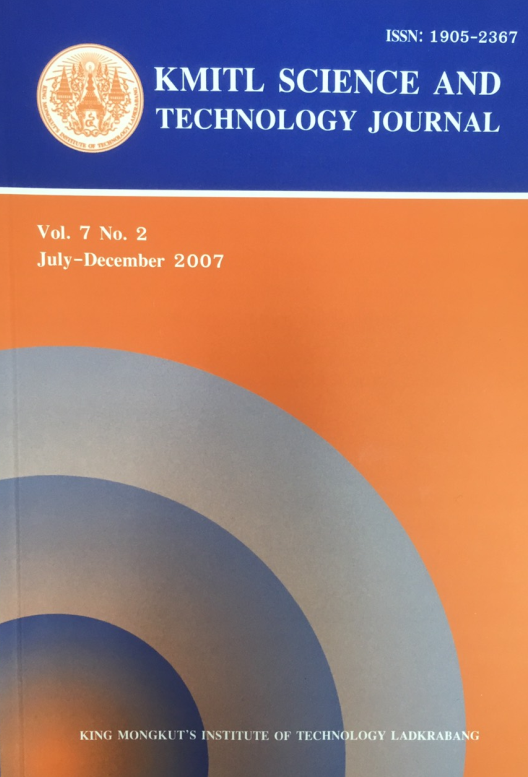FACTORS AFFECTING THE KNOWLEDGE AND UNDERSTANDING OF HEALTH IMPACT ASSESSMENT MANUAL OF CONSULTANT FIRMS IN THAILAND FOR PRACTICAL CHANNEL
Main Article Content
Abstract
The purposes of this research were to study the knowledge, understanding and their affecting factors of Health Impact Assessment (HIA) manual of consultant firms, and to find out problems and obstacles, in order to recommend guidelines for the consultant firms to act upon the HIA manual. A questionnaire was employed to collect data from 50 consultant firms registered with the Office of Natural Resources and Environmental Policy and Planning (ONEP). The descriptive statistics, i.e., percentage, mean, and standard deviation were applied to analyze the data whereas; the t–test, F–test, and Correlation were applied for inferential statistic test. The results revealed that the majority of the consultant firms (57.14%) had moderate knowledge and level of understanding of HIA manual. In addition, the studied factors, i.e., firm size, numbers of public health experts, numbers of received information, numbers of sources of received information, numbers of project categories studied by consultant firms, participation in HIA activities, including policy of the firms, the status of being Public Health Association member, attentions in HIA, and opinion to act upon the HIA manual was not significantly related to the knowledge and understanding of the manual. From the study, the ONEP should be advised to give more information to the consultant firms through its homepage. Moreover, the authority should offer more training courses in HIA, improve for a clear and compact HIA manual, and separate the manual into individual projects. Simultaneously, public health database should be collected for HIA, along with the arrangement of pilot projects in several categories of projects under the authority’s duty, whilst HIA courses should be increased and introduced in universities.
Keywords: assessment, consultant firm, environment, guideline, health and manual
Corresponding author: E-mail: tawatc.s@nida.nida.ac.th
Article Details
Copyright Transfer Statement
The copyright of this article is transferred to Current Applied Science and Technology journal with effect if and when the article is accepted for publication. The copyright transfer covers the exclusive right to reproduce and distribute the article, including reprints, translations, photographic reproductions, electronic form (offline, online) or any other reproductions of similar nature.
The author warrants that this contribution is original and that he/she has full power to make this grant. The author signs for and accepts responsibility for releasing this material on behalf of any and all co-authors.
Here is the link for download: Copyright transfer form.pdf
References
[2] Suppadit, T. 2003. Environmental Health Management. Bangkok, Center of Graduate Studies Development, National Institute of Development administration, Thailand.
[3] Chanthalukana, J. 1980. Statistical and Research Methodology. Bangkok, Thaiwattanapanit Press, Thailand.
[4] Reungpraphan, C. 2001. Data Analysis Program: SPSS for Windows. Khonkaen, Khonkaen University Printing House, Thailand.
[5] Wasnnonth, C. 1996. Human Resource Development in Non-government Organizations (NGOs): A Case Study of NGOs in Bangkok. M.Sc. thesis, National Institute of Development Administration, Thailand.
[6] Juruwichaipong, C. 1996. Water Using Behavior and Domestic Wastewater Management of Households in Phetchaburi Municipality, Phetchaburi Province. M.A. thesis, Mahidol University, Thailand.
[7] Emkosa, C. 2003. Knowledge and Understanding of the Agricultural Organization Leaders about the Act of the Farmer Rehabilitation and Development Fund, B.E. 2542: A Case Study of Ubonratchathani Province. M.A. thesis, National Institute of Development Administration, Thailand.
[8] Samittanonth, P. 1996. Knowledge and Practices on Environmental Conservation of Cavin Attendants of Thai Airways International and Japan Airlines. M.A. thesis, Mahidol University, Thailand.
[9] Pakcharean, P. 1997. Knowledge, Attitude and Behavior on Infectious Waste Management of Nurses: A Case Study of Hospitals under Public Health Ministry in Chantaburi Province. M.A. thesis, Mahidol University, Thailand.
[10] Petrapoonsinchai, P. 2004. Environmental Management of Jewelry Industry: A Case Study of Greatest Gold Group Company Limited. M.A. thesis, National Institute of Development Administration, Thailand.
[11] Lorruangsilp, P. 2005. Influential Factors Involving the Electricity Conservation Behavior of the Office of Natural Resources and Environmental Policy and Planning. M.Sc. research paper, National Institute of Development Administration, Thailand.
[12] Pornlertwiwat, S. 1998. Factors Affecting the Participation of Community Forest Conservation Organization’s Members in Community Forest Conservation: A Case Study of the Tha Wangsai Village, Tambol Wangmi, Wangnamkhiew District, Nakhon Ratchasima Province. M.A. thesis, National Institute of Development Administration, Thailand.
[13] Chotpreakchookul, P. 1996. Factors Affecting Knowledge, Attitude and Behavior in Efficient Household Water Use of Lanpang Municipality Housewives. M.Sc. thesis, Mahidol University, Thailand.


